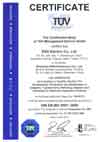

ISO Summary

ENG Electric is proud to announce it's success in the qualification
process and certification to ISO9001.
ISO stands for the International Organization
for Standardization. At present, 130 countries belong to this organization
including the United States of America. ISO's objective
is to promote the development of standards worldwide for purposes of improved
operating efficiency, improved productivity, and reduced cost.
One of the standards developed
by ISO is ISO-9000. While ISO-9000 has at times been perceived in North
America as a European standard, it is in fact an international set of
documents written by members of a worldwide committee (ISO / Technical
Committee 176). ISO-9000 is an international standard for the implementation
and management of a quality assurance system.
To receive ISO-9000 certification,
applicants must demonstrate a mastering of the following "Quality
System Elements":
![]() Management Responsibility
Management Responsibility
![]() Quality System Principles
Quality System Principles
![]() Document Control
Document Control
![]() Purchasing
Purchasing
![]() Product Identification and Traceability
Product Identification and Traceability
![]() Control of Production
Control of Production
![]() Inspection and Testing
Inspection and Testing
![]() Inspection, Measuring and Test Equipment
Inspection, Measuring and Test Equipment
![]() Inspection and Test Status
Inspection and Test Status
![]() Control of Non-conforming Product
Control of Non-conforming Product
![]() Corrective Action
Corrective Action
![]() Handling, Storage, Packaging and Delivery
Handling, Storage, Packaging and Delivery
![]() Quality Records
Quality Records
![]() Internal Audits
Internal Audits
![]() Training
Training
![]() Statistical Techniques
Statistical Techniques
Also, there are basically three levels of documentation required by ISO-9000.
The top level
is the Quality Manual. This document explains company policy regarding
each of the Quality System Elements (see preceding page for the listing
of the Quality System Elements).
The second level
of documentation consists of the various Operating Procedures.
These documents identify and explicitly detail all department and quality
assurance procedures.
The
third level of documentation contains specific
work instructions, inspection procedures, and record forms, etc.
For your reference, we have listed below some of the benefits we feel
are associated with ISO-9000 certification:
Worldwide Recognition.
Over the past couple of years there has been an increasing trend toward
universal acceptance of ISO-9000 as a quality system standard. Many buyers
and sellers worldwide see the benefit of using a common standard.
Improved Quality and
Productivity. ISO certification assures a high level
of product quality and productivity. Successful certification to an ISO-9000
standard through a recognized accreditation body assures that a good quality
management system exists and is functioning properly.
Builds Customer Confidence.
A quality system certified to an ISO-9000 standard can be used to convince
prospective customers that a company is capable of producing products
according to their requirements. This qualified opinion of an impartial
third-party can give extra confidence to customers who would otherwise
rely solely on the claims of the manufacturer.
ISO protocols require that all standards be reviewed at least every five
years. The 1994 versions of the ISO9000 standards are currently
being revised by ISO's Technical Committee TC176, for publication in the
year 2000. Detailed information regarding this revision process
may be obtained by consulting the following Internet websites: www.iso.ch
or www.bsi.org.uk/iso-tc176-sc2/
One of the results of this revision will be the replacement of the 1994
editions of ISO9001, ISO9002, and ISO9003 standards with a single ISO9001:2000
standard. Additionally the Quality System Elements (listed above)
will be restructured into 4 major areas: Management Responsibility; Resource
Management; Product Realization; and Measurement, Analysis and Improvement.
The roles of top management and customer focus will be emphasized more.
ISO9001:2000 will be based on the following eight management principles:
![]() Customer-Focused Organization
Customer-Focused Organization
![]() Leadership
Leadership
![]() Involvement of People
Involvement of People
![]() Process Approach
Process Approach
![]() System Approach to Management
System Approach to Management
![]() Continual Improvement
Continual Improvement
![]() Factual Approach to Decision-Making
Factual Approach to Decision-Making
![]() Mutually Beneficial Supplier Relationship
Mutually Beneficial Supplier Relationship
Certificates issued to these 1994 editions of ISO9000 will only have a
maximum validity of three years from the date of publication of ISO9001:2000.
© 2012 ENG Electric Company. All rights reserved.
Commercial use of images, forms, & data on this site is not permitted.